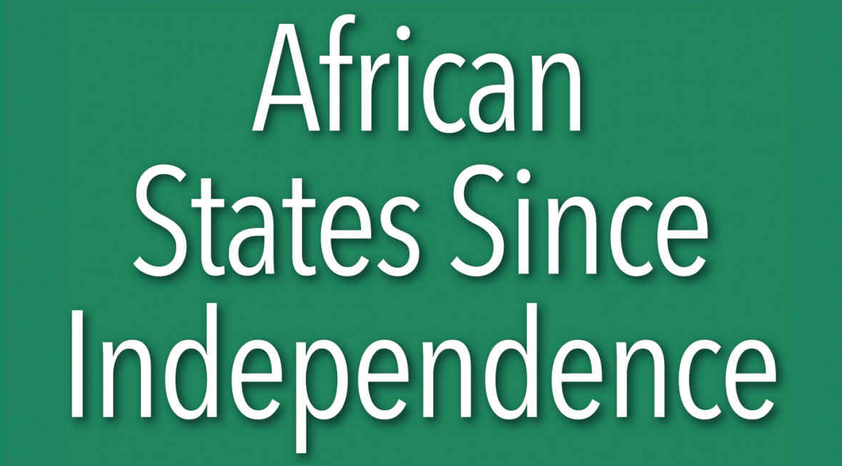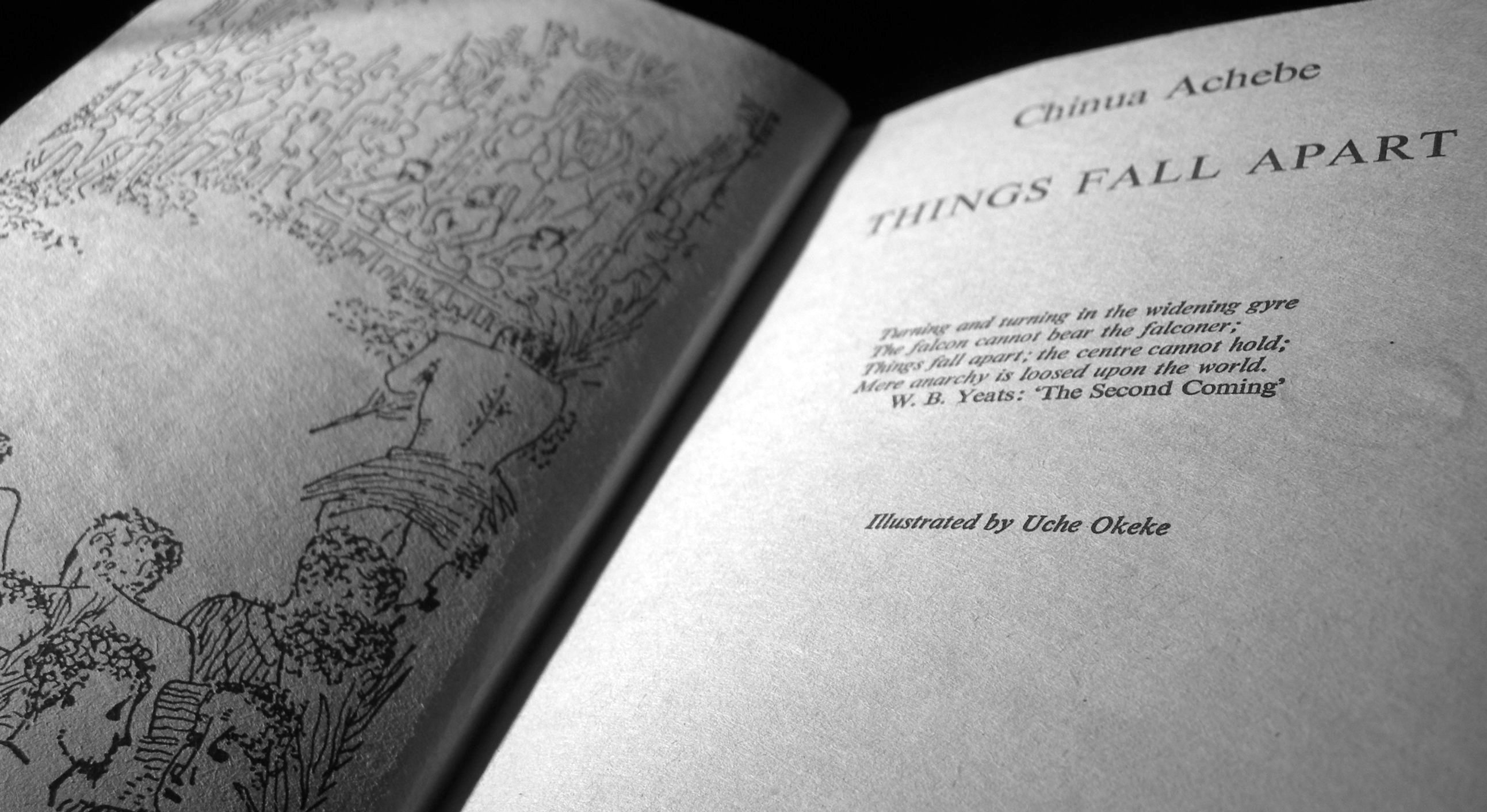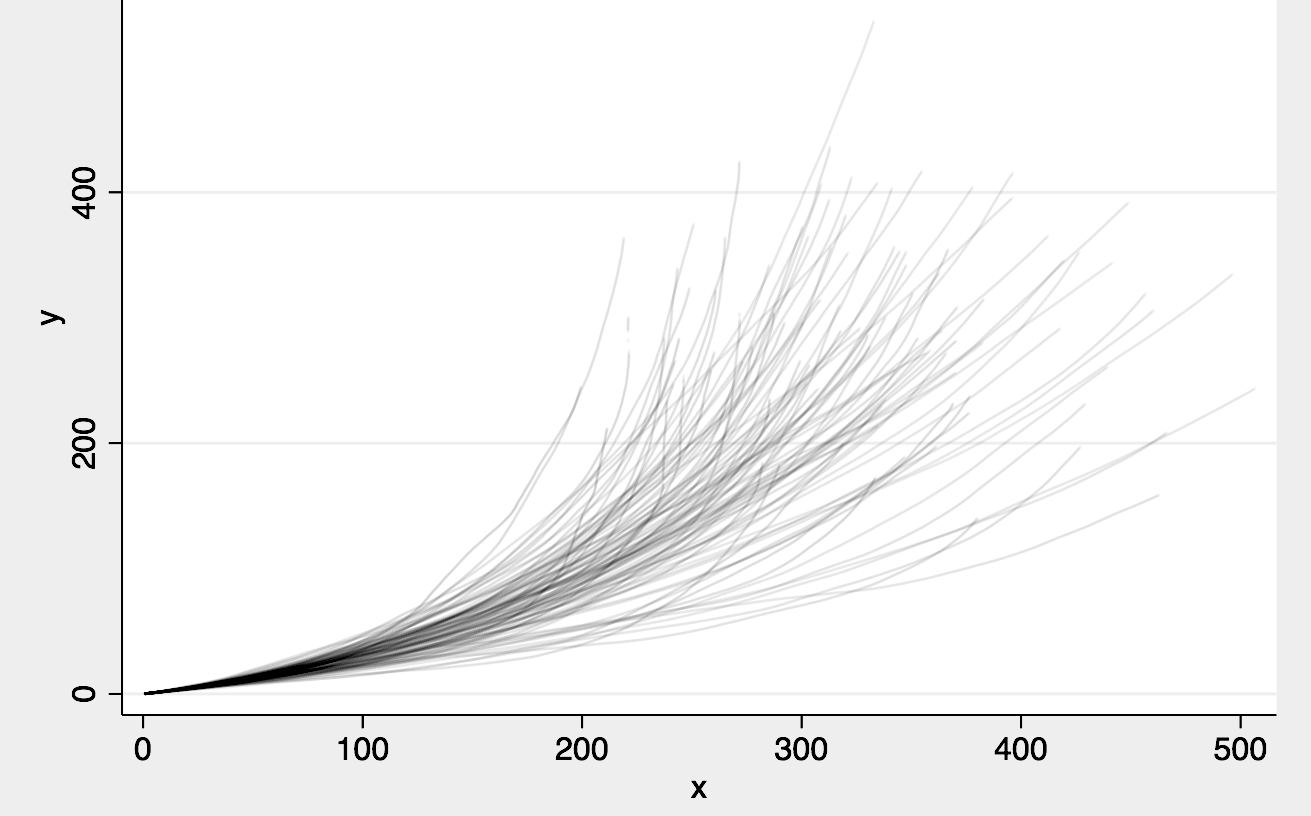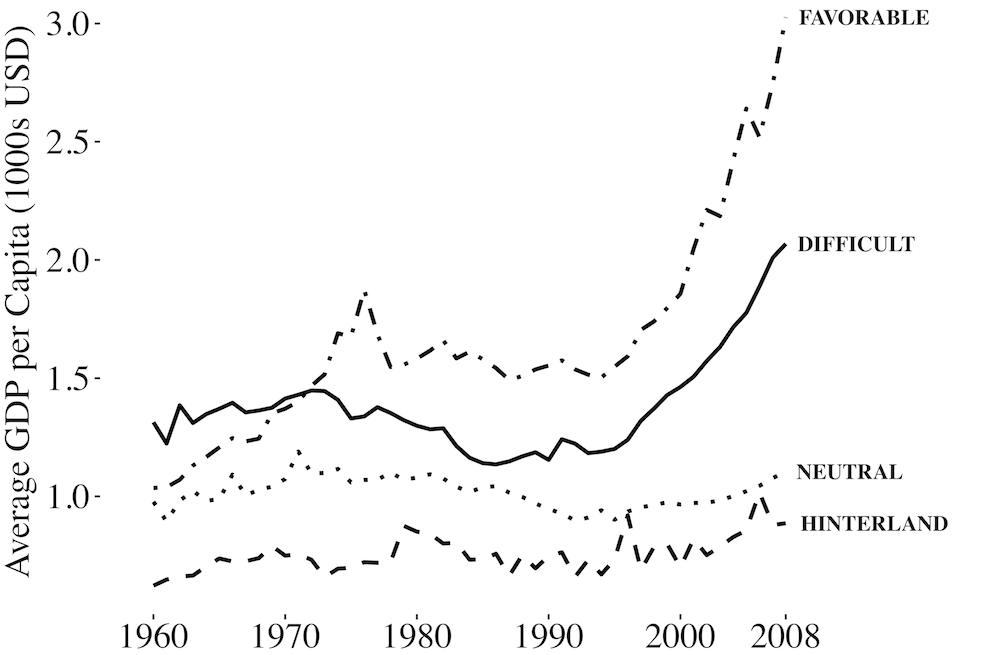African States Since Independence argues that an interplay of geographic, historical, and demographic factors undergird sub-Saharan states’ post-independence struggles to eradicate poverty, establish democratic accountability, and quell civil unrest.
Relying on the best statistical data and richly illustrated with case material, the book is an indispensable source for scholars and policy analysts seeking to understand Africa’s post-independence political trajectories.
Book Outline
One-quarter syllabus from Laitin’s UG Seminar
This course will arm students with current research on what two economists labeled ‘Africa’s Growth Tragedy.’ It will focus on early failures in economic growth, political stability, and democracy. The principal text for this course was written by the instructor along with Darin Christensen, an assistant professor at UCLA. Each week students will be asked to read material from the book for the first meeting, and in the second meeting to apply it, with slides based on research and data analysis, to their chosen country. Students will receive full instructions on how to access the data and to plot the assigned tables and figures. Assignments are due at 5 pm the evening before the class session. The final paper asks students to compare their country’s performance to other sub-Saharan states.
Introduction to the Course and student selection of a country to specialize in over the course of the quarter. Once chosen, students should consult the suggestions for most African countries of a classic work in political science appended to this syllabus, relevant articles downloaded from JSTOR, and with subject librarians to gain historical and cultural background for their country.
Students should choose a country to ‘specialize in’ over the quarter. The assignments will ask them to compare the experience of their chosen country to other sub-Saharan and developing states.
The R and Stata files below will guide students in preparing figures and tables for their assignments.
Readings from Book:
- Preface
- Introduction
- Chapter 1: The Charismatic Founders and Their Dreams
Supplementary Material:
- Wainaina, Binyavanga. 2005. ‘How to Write About Africa.’ Granta 92.
- Film: Lumumba. Directed by Raoul Peck. 2000.
- Film: Mobutu, King of Zaire. Directed by Thierry Michel. 1999.
- Fiction: wa Thiong’o, Ngugi. 1967. A Grain of Wheat. London: Heinemann.
- Meredith, Martin. 2005. ‘L’Afrique Noir’ and ‘Winds of Change.’ In The Fate of Africa: A History Of Fifty Years Of Independence. New York: Public Affairs.
Research the founding father of your country. Prepare a slide presentation on the founding father’s background, his political vision, and his tenure as a leader. (Alas, the first female elected leader in sub-Saharan Africa is Ellen Johnson Sirleaf, and not until 2006. Hence, the male pronoun.) Provide information if he faced any important challengers with either a different vision or a different support base. What happened to this opponent’s political career? Finally, discuss how his presidency ended, and whether he successfully advanced his vision. Consult the founding father’s biographies or autobiographies, political histories (with suggestions appended to this syllabus), and contemporary news sources to prepare this presentation.
Readings from Book:
- Chapter 2: Lag in Human Development
- Chapter 3: Lag in Democracy
- Chapter 4: Lag in Social Order
Supplementary Material:
- Acemoglu, Daron and James Robinson. 2006. ‘Economic Backwardness in Political Perspective.’ American Political Science Review 100, no. 1: 115-131.
- Film: Xala. Directed by Ousmane Sembène. 1975.
Assess the progress of sub-Saharan African (SSA) countries between independence and 1992. Compare the experience of SSA countries to those countries participating in the solidarity conference in Bandung, Indonesia — a set of post-colonial states that also achieved independence after WWII. Prepare a four-slide presentation to characterize their progress in terms of economic development, political liberalism, and social order.
Supplementary Material:
- Memoir: Mahama, John Dramani. 2012, My First Coup d’Etat: And Other True Stories from the Lost Decades of Africa. New York: Bloomsbury Publishing.
- van de Walle, Nicolas. 2001. ‘Decision Making in Postcolonial Africa.’ In African Economies and the Politics of Permanent Crisis, 1979-1999, 113-51. New York: Cambridge University Press.
- Wrong, Michela. 2009. It’s Our Turn to Eat: The Story of a Kenyan Whistle-Blower. New York: HarperCollins.
- Nugent, Paul. 2004. ‘Khaki Fatigue: Military Rule in Africa, 1960-1985.’ In Africa since Independence: A Comparative History. New York: Palgrave Macmillan.
- Roessler, Phillip. 2011. ‘The Enemy Within: Personal Rule, Coups, and Civil War in Africa,’ World Politics 63, no. 2. 300-46.
- Collier, Paul. 2007. ‘The Conflict Trap.’ In The Bottom Billion. New York: Oxford University Press.
- Bayart, Jean-François. 1981. ‘L’Etat par le bas in Afrique Noire.’ Politiques Africaines 1. 53-81.
- Mbembe, Achille. 2001. On the Postcolony. Oakland: University of California Press.
Readings from Book:
- Chapter 5: Geography and Demography
Supplementary Material:
- Herbst, Jeffrey. 2015. States and Power in Africa: Comparative Lessons in Authority and Control, Chapters 1, 3, and 5. Princeton: Princeton University Press.
Prepare a two-slide presentation on the geographic constraints of your country.
Readings from Book:
- Chapter 6: Extractive Institutions
Supplementary Material:
- Film: Sankofa. Directed by Haile Gerima. 1993.
- Film: Adanggaman. Directed by Roger Gnoan M’Bala. 2000.
- Nunn, Nathan and Leonard Wantchekon. 2011. ‘The Slave Trade and the Origins of Mistrust in Africa.’ American Economic Review 101, no. 7. 3221-52.
Prepare a presentation on the slave trade’s contemporary impacts on your chosen country.
Supplementary Material:
- Hochschild, Adam. 1998. King Leopold’s Ghost: A Story of Greed, Terror, and Heroism in Colonial Africa. Boston: Houghton Mifflin.
- Jensen, Nathan and Leonard Wantchekon. 2004. ‘Resource Wealth and Political Regimes in Africa.’ Comparative Political Studies 37. 816-41.
Readings from Book:
- Chapter 7: The Missionaries
Supplementary Material:
- Achebe, Chinua. 1958. Things Fall Apart. London: Heinemann.
- Woodberry, Robert. 2012. “The Missionary Roots of Liberal Democracy.” American Political Science Review 106, no. 2. 244-74.
- Film: Ceddo. Directed by Ousmane Sembène. 1977.
Readings from Book:
- Chapter 8: The Partition of Africa
Supplementary Material:
- Easterly, William and Ross Levine. ‘Africa’s Growth Tragedy: Policies and Ethnic Divisions.’ The Quarterly Journal of Economics 112, no. 4. 1203–50.
- Fearon, James. 2003. ‘Ethnic and Cultural Diversity by Country.’ Journal of Economic Growth 8, no. 2. 195-222.
- Miguel, Edward. 2004. ‘Tribe or Nation? Nation-Building and Public Goods in Kenya versus Tanzania.’ World Politics 56, no. 3. 327-62.
Prepare a presentation about the effect of ethno-linguistic fractionalization on contemporary outcomes.
Supplementary Material:
- Philip Gourevitch. 1998. We Wish to Inform You That Tomorrow We Will Be Killed With Our Families: Stories from Rwanda. New York: Farrar Straus and Giroux.
- Appiah, Kwame. 1993. In My Father’s House: Africa in the Philosophy of Culture. New York: Oxford University Press.
Readings from Book:
- Chapter 9: The Colonial State
Supplementary Material:
* Film: Camp de Thiaroye. Directed by Ousmane Sembène and Thierno Faty Sow. 1988.
* Film: Black and White in Color. Directed by Jean-Jacques Annaud. 1976.
* Fiction: Dangarembga, Tsitsi. 1988. Nervous Conditions. Berkeley: Seal Press.
* Crowder, Michael. 1964. ‘Indirect Rule: French and British Style.’ Africa 34. 197-205. Also in Perspectives on the African Past. 1972. Eds. Martin A. Klein and G. Wesley Johnson. Boston: Little, Brown and Company.
* Sociology: Fanon, Frantz. 1952. Peau noire, masques blancs [Black Skin, White Masks]. Translated by Richard Philcox. New York: Grove Books.
* Sociology: Fanon, Frantz. 1961. Les damnés de la terre, Maspero [The Wretched of the Earth]. Translated by Richard Philcox. New York: Grove Books.
* Sociology: Mamdani, Mahmood. 2018. Citizen and Subject: Contemporary Africa and the Legacy of Late Colonialism. Princeton: Princeton University Press.
What were the most salient features of your country’s colonial experience? Does the ‘bula matari’ metaphor work for your country? Prepare to discuss these questions by gathering information on the following topics:
Prepare a presentation on the effect of colonial infrastructure and institutions on contemporary outcomes. Each slide should have a scatter plot for all SSA countries, a regression line, and a clear indication of your country on the graph.
Supplementary Material:
- Acemoglu, Daron, James Robinson, and Simon Johnson. 2001. ‘The Colonial Origins of Comparative Development: An Empirical Investigation.’ American Economic Review 91, no. 5. 1369-401.
- Lee, Alexander and Ken Schultz. 2010. ‘Comparing British and French Colonial Legacies: A Discontinuity Analysis of Cameroon.’ Quarterly Journal of Political Science 7, no. 4. 365-410.
- Michalopoulos, Stelios and Elias Papaioannou. 2016. ‘The Long-Run Effects of the Scramble for Africa.’ American Economic Review 106, no. 7. 1802-48.
Readings from Book:
- Chapter 10: Cultural Policy
Supplementary Material:
- Laitin, David and Rajesh Ramachandran. 2016. ‘Language Policy and Human Development.’ American Political Science Review 110, no. 3. 457-80.
- Fiction: Ngozi, Chimamanda Adiche. 2006. Half of a Yellow Sun. New York: Penguin Random House.
- Posner, Daniel. 2003. ‘The Colonial Origins of Ethnic Cleavages: The Case of Linguistic Divisions in Zambia.’ Comparative Politics 35, no. 2. 127-46.
- Adida, Claire. 2014. Immigrant Exclusion and Insecurity in Africa: Coethnic Strangers. New York: Cambridge University Press.
Write a short memo (3-5 pages) on language policy in your country after independence. In the memo, investigate the extent to which indigenous language policies was ever debated in the post-independence years. Use newspapers, texts, and/or library books. The memo should summarize the language debates, the results of these debates in terms of the place of indigenous languages in public life, in the media, and in schooling.
Readings from Book:
- Chapter 11: Foreign Policy
Supplementary Material:
- Zartman, I. William. 2013. ‘The Diplomacy of African Boundaries.’ In Africa in World Politics, 5th Edition, edited by John W. Harbeson and Donald Rothchild, 173-185. Boulder: Westview Press.
- Arthur, Peter. 2015. ‘‘New’ Regionalisms in Africa: Approaches, Challenges, Opportunities and Implications.’ In Contemporary Regional Development in Africa, edited by Kobena T. Hanson, 47-69. Abingdon: Routledge.
After a search of African news in Lexis-Nexis, write a short memo on your country’s relationship to and activities having to do with economic and military cooperation with other African states in general, and within the African Union in particular.
Readings from Book:
- Chapter 12: Economic Policy
Supplementary Material:
- Film: Bamako. Directed by Abderrahmane Sissako. 2006.
- van de Walle, Nicolas. ‘Approaches to Africa’s Permanent Crisis.’ In African Economies and the Politics of Permanent Crisis. New York: Cambridge University Press.
- Wainaina, Binyavanga. 2008. ‘The Ethics of Aid: One Kenyan’s Perspective.’ Interview by Krista Tippett. On Being, NPR, December 4, 2008. Audio. - Okonjo-Iweala, Ngozi. - Okonjo-Iweala, Ngozi. 2007. ‘Want to help Africa? Do Business There.’ TEDtalk. TED2007, March 2007. Audio.
Readings from Book:
- Chapter 13: Democratization and the “Third Wave”
- Chapter 14: Economic Stabilization
- Chapter 15: Rebuilding War-Torn States
Supplementary Material:
- van de Walle, Nicholas. 2001. ‘Democratization and the Prospects for Change.’ In African Economies and the Politics of Permanent Crisis, 1979-1999. New York: Cambridge University Press.
- Harding, Robin and David Stasavage. 2014. ‘What Democracy Does (and Doesn’t Do) for Basic Services: School Fees, School Inputs, and African Elections.’ Journal of Politics 76, no. 1. 229-45.
- Burgess, Robin, Remi Jedwab, Edward Miguel, Ameet Morjaria, and Gerard Padro i Miquel. 2015. ‘The Value of Democracy: Evidence from Road Building in Kenya.’ American Economic Review 105, no. 6. 1817-51.
- Lindberg, Staffan. 2010. ‘What Accountability Pressures do MPs in Africa Face and How Do They Respond? Evidence from Ghana.’ Journal of Modern African Studies 48, no. 1. 117-42.
- Barkan, Joel, Robert Mattes, Shaheen Mozaffar, and Kimberly Smiddy. 2010. ‘The African Legislatures Project: First Findings.’ Centre for Social Science Research Working Paper No. 277.
- Wantchekon, Leonard. 2003. ‘Clientelism and Voting Behavior: Evidence from a Field Experiment in Benin.’ World Politics 55, no. 2. 399-422.
Readings from Book:
- Chapter 16: Conclusion
Prepare a four-slide presentation on the contemporary era, specifically after 1992. Prepare three slides on human development (infant mortality), political liberalization (Polity scores), and social order (fragility).
Supplementary Material:
- Film: An African Election. Directed by Jarreth J. Merz. 2010.
- Radelet, Steven. 2010. Emerging Africa: How 17 Countries are Leading the Way. Washington, DC: Center for Global Development.
- Gyimah-Boadi, E. 2015. ‘Africa’s Waning Democratic Commitment.’ Journal of Democracy 26, no. 1. 101-13.
Consolidating your analysis during the quarter, write a short essay (15 pages) about the country you have focused on, and on each of the outcomes, whether it fits or does not fit the general patterns experienced on the continent. Offer potential explanations for why or why not? In general, identify and account for the factors relevant to the country’s trajectory that are not captured in the general models.
UG assignments with a focus on data analysis
Students should choose a country to specialize in over the term. The assignments will ask them to compare the experience of their chosen country to other sub-Saharan and developing states.
The R and Stata files below will guide students in preparing figures and tables for their assignments.
Research the founding father of your country. Prepare a slide presentation on the founding father’s background, his political vision, and his tenure as a leader.1 Provide information if he faced any important challengers with either a different vision or a different support base. What happened to this opponent’s political career? Finally, discuss how his presidency ended, and whether he successfully advanced his vision. Consult the founding father’s biographies or autobiographies, political histories (with suggestions appended to this syllabus), and contemporary news sources to prepare this presentation.
Assess the progress of sub-Saharan African (SSA) countries between independence and 1992. Compare the experience of SSA countries to those countries participating in the solidarity conference in Bandung, Indonesia — a set of post-colonial states that also achieved independence after WWII. Prepare a four-slide presentation to characterize their progress in terms of economic development, political liberalism, and social order.
Prepare a two-slide presentation on the geographic constraints of your country.
Prepare a presentation on the slave trade’s contemporary impacts on your chosen country.
Prepare a presentation about the effect of ethno-linguistic fractionalization on contemporary outcomes.
What were the most salient features of your country’s colonial experience? Does the ‘bula matari’ metaphor work for your country? Prepare to discuss these questions by gathering information on the following topics:
Prepare a presentation on the effect of colonial infrastructure and institutions on contemporary outcomes. Each slide should have a scatter plot for all SSA countries, a regression line, and a clear indication of your country on the graph.
Write a short memo (3-5 pages) on language policy in your country after independence. In the memo, investigate the extent to which indigenous language policies was ever debated in the post-independence years. Use newspapers, texts, and/or library books. The memo should summarize the language debates, the results of these debates in terms of the place of indigenous languages in public life, in the media, and in schooling.
After a search of African news in Lexis-Nexis, write a short memo on your country’s relationship to and activities having to do with economic and military cooperation with other African states in general, and within the African Union in particular.
Prepare a four-slide presentation on the contemporary era, specifically after 1992. Prepare three slides on human development (infant mortality), political liberalization (Polity scores), and social order (fragility).
Consolidating your analysis during the quarter, write a short essay (15 pages) about the country you have focused on, and on each of the outcomes, whether it fits or does not fit the general patterns experienced on the continent. Offer potential explanations for why or why not? In general, identify and account for the factors relevant to the country’s trajectory that are not captured in the general models.
Download figures used in manuscript.
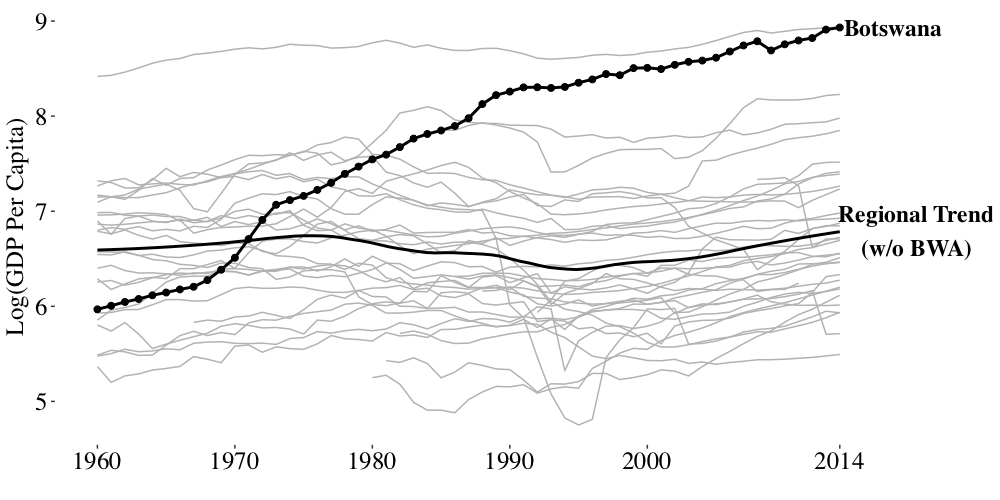
A note from the authors.
African States since Independence is a book written for Africans seeking to better understand the course of their country’s history since independence; it is written for university students throughout the world who are taking courses in African politics; it is written for professors teaching those courses, enabling them to update their material with new data and analysis; and it is written for those assigned to work in Africa — in the private sector, for international organizations, as diplomats from their own states, and as workers for non-governmental organizations. We try to inform without being didactic; to generalize without ignoring the impressive diversity across the continent; and to expose failures without losing optimism about Africa’s future. We hope that professors and students especially will take advantage of the data and the problem sets available on this website allowing for statistical analysis, as we hope this book will encourage continued engagement with Africa and its enormous promise. We welcome your feedback on how to improve the book and expand the supplementary materials.
Darin Christensen, Assistant Professor of Public Policy and Political Science, UCLA
David D. Laitin, Watkins Professor of Political Science, Stanford University
